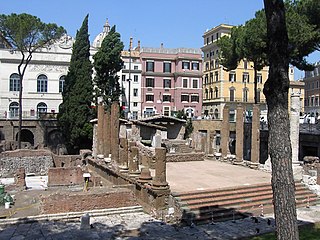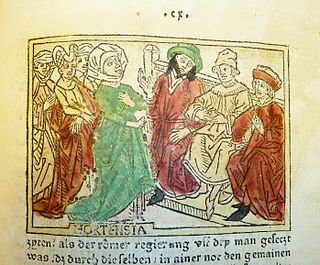Related Research Articles
Quintus Lutatius Catulus was a consul of the Roman Republic in 102 BC. His consular colleague was Gaius Marius. During their consulship the Cimbri and Teutones marched south again and threatened the Republic. While Marius marched against the Teutones in Gaul, Catulus had to keep the Cimbri from invading Italy. In this he failed; the Cimbri succeeded in invading the Po Valley. In 101 BC Catulus, as proconsul, continued the war against the Cimbri. Marius, elected consul for the fifth time, joined him and together they campaigned against the Germanic invaders in the Po Valley. At the Battle of Vercellae Marius and Catulus decisively defeated the Cimbri and ended the Germanic invasion. After Vercellae the two feuded, and Catulus consequently committed suicide following Marius's victory in the civil war of 87 BC.

The gens Valeria was a patrician family at ancient Rome, prominent from the very beginning of the Republic to the latest period of the Empire. Publius Valerius Poplicola was one of the consuls in 509 BC, the year that saw the overthrow of the Tarquins, and the members of his family were among the most celebrated statesmen and generals at the beginning of the Republic. Over the next ten centuries, few gentes produced as many distinguished men, and at every period the name of Valerius was constantly to be found in the lists of annual magistrates, and held in the highest honour. Several of the emperors claimed descent from the Valerii, whose name they bore as part of their official nomenclature.
The gens Tullia was a family at ancient Rome, with both patrician and plebeian branches. The first of this gens to obtain the consulship was Manius Tullius Longus in 500 BC, but the most illustrious of the family was Marcus Tullius Cicero, the statesman, orator, and scholar of the first century BC. The earliest of the Tullii who appear in history were patrician, but all of the Tullii mentioned in later times were plebeian, and some of them were descended from freedmen. The English form Tully, often found in older works, especially in reference to Cicero, is now considered antiquated.
Marcus Valerius Messalla Corvinus was a Roman general, author, and patron of literature and art.
Mucia Tertia was a Roman matrona who lived in the 1st century BC. She was the daughter of Quintus Mucius Scaevola, the pontifex maximus and consul in 95 BC.

The gens Pompeia was a plebeian family at ancient Rome, first appearing in history during the second century BC, and frequently occupying the highest offices of the Roman state from then until imperial times. The first of the Pompeii to obtain the consulship was Quintus Pompeius in 141 BC, but by far the most illustrious of the gens was Gnaeus Pompeius, surnamed Magnus, a distinguished general under the dictator Sulla, who became a member of the First Triumvirate, together with Caesar and Crassus. After the death of Crassus, the rivalry between Caesar and Pompeius led to the Civil War, one of the defining events of the final years of the Roman Republic.

The gens Cornelia was one of the greatest patrician houses at ancient Rome. For more than seven hundred years, from the early decades of the Republic to the third century AD, the Cornelii produced more eminent statesmen and generals than any other gens. At least seventy-five consuls under the Republic were members of this family, beginning with Servius Cornelius Maluginensis in 485 BC. Together with the Aemilii, Claudii, Fabii, Manlii, and Valerii, the Cornelii were almost certainly numbered among the gentes maiores, the most important and powerful families of Rome, who for centuries dominated the Republican magistracies. All of the major branches of the Cornelian gens were patrician, but there were also plebeian Cornelii, at least some of whom were descended from freedmen.

The gens Marcia, occasionally written Martia, was one of the oldest and noblest houses at ancient Rome. They claimed descent from the second and fourth Roman Kings, and the first of the Marcii appearing in the history of the Republic would seem to have been patrician; but all of the families of the Marcii known in the later Republic were plebeian. The first to obtain the consulship was Gaius Marcius Rutilus in 357 BC, only a few years after the passage of the lex Licinia Sextia opened this office to the plebeians.
Marcus Valerius Messalla Niger was a senator of the Roman Republic.

The gens Lutatia, occasionally written Luctatia, was a plebeian family of ancient Rome. The first of the gens to obtain the consulship was Gaius Lutatius Catulus in 242 BC, the final year of the First Punic War. Orosius mentions their burial place, the sepulchrum Lutatiorum, which lay beyond the Tiber.

Hortensia, daughter of consul and advocate Quintus Hortensius, earned renown during the late Roman Republic as a skilled orator. She is best known for giving a speech in front of the members of the Second Triumvirate in 42 BC that resulted in the partial repeal of a tax on wealthy Roman women.
Sulla's civil war was fought between the Roman general Lucius Cornelius Sulla and his opponents, the Cinna-Marius faction, in the years 83–82 BC. The war ended with a decisive battle just outside Rome itself. After the war the victorious Sulla made himself dictator of the Roman Republic.
Quintus Pedius Poplicola or Publicola was a Roman who came from a Roman senatorial family.
Quintus Pompeius was the name of various Romans from the gens Pompeia, who were of plebeian status. They lived during the Roman Republic and Roman Empire.

The gens Caecilia was a plebeian family at ancient Rome. Members of this gens are mentioned in history as early as the fifth century BC, but the first of the Caecilii who obtained the consulship was Lucius Caecilius Metellus Denter, in 284 BC. The Caecilii Metelli were one of the most powerful families of the late Republic, from the decades before the First Punic War down to the time of Augustus.
Marcus Valerius Messalla Rufus, was a Roman senator who was elected consul for 53 BC.
The gens Gratidia was a plebeian family at ancient Rome. Originally coming from Arpinum, members of this gens are known from the final century of the Republic.
The gens Hortensia was an ancient plebeian family in Rome. Members of this gens are first mentioned in the fifth century BC, but from that time somewhat infrequently until the final century of the Republic. The most illustrious of the gens was the orator Quintus Hortensius, a man of great learning, and a contemporary of Cicero. Under the Empire they seem to have sunk back into obscurity.
References
![]() This article incorporates text from a publication now in the public domain : William Ramsay (1870). "Valeria". In Smith, William (ed.). Dictionary of Greek and Roman Biography and Mythology . Vol. 3. p. 1215.
This article incorporates text from a publication now in the public domain : William Ramsay (1870). "Valeria". In Smith, William (ed.). Dictionary of Greek and Roman Biography and Mythology . Vol. 3. p. 1215.
- ↑ Syme, R., Augustan Aristocracy, pp. 227 f.
- ↑ Plutarch, Sulla 35, 37; Wilhelm Drumann, Geschichte Roms, vol. ii. p. 508. (cited in Smith)
- ↑ Review of Potitus Valerius Messalla Consul Suffect 29 B.C. by Arthur E. Gordon, in Journal of Roman Studies , 45 (1955), page 155 and Roman Papers, Volume I, page 260. Syme cites Plutarch, Sulla, 35 .
- ↑ Telford, Lynda (2014). Sulla: A Dictator Reconsidered (illustrated ed.). Pen and Sword. p. 227. ISBN 9781783030484.
- ↑ Telford, Lynda (2014). Sulla: A Dictator Reconsidered (illustrated ed.). Pen and Sword. p. 228. ISBN 9781783030484.
- ↑ Marcus Tullius Cicero; Dyck, Andrew R. (2012). Marcus Tullius Cicero: Speeches on Behalf of Marcus Fonteius and Marcus Aemilius Scaurus: Translated with Introduction and Commentary. Clarendon Ancient History Series (illustrated ed.). OUP Oxford. p. 98. ISBN 9780199590056.
- ↑ Acta Classica. Roman life and letters. Vol. 1. A.A. Balkema. 1960. p. 74.